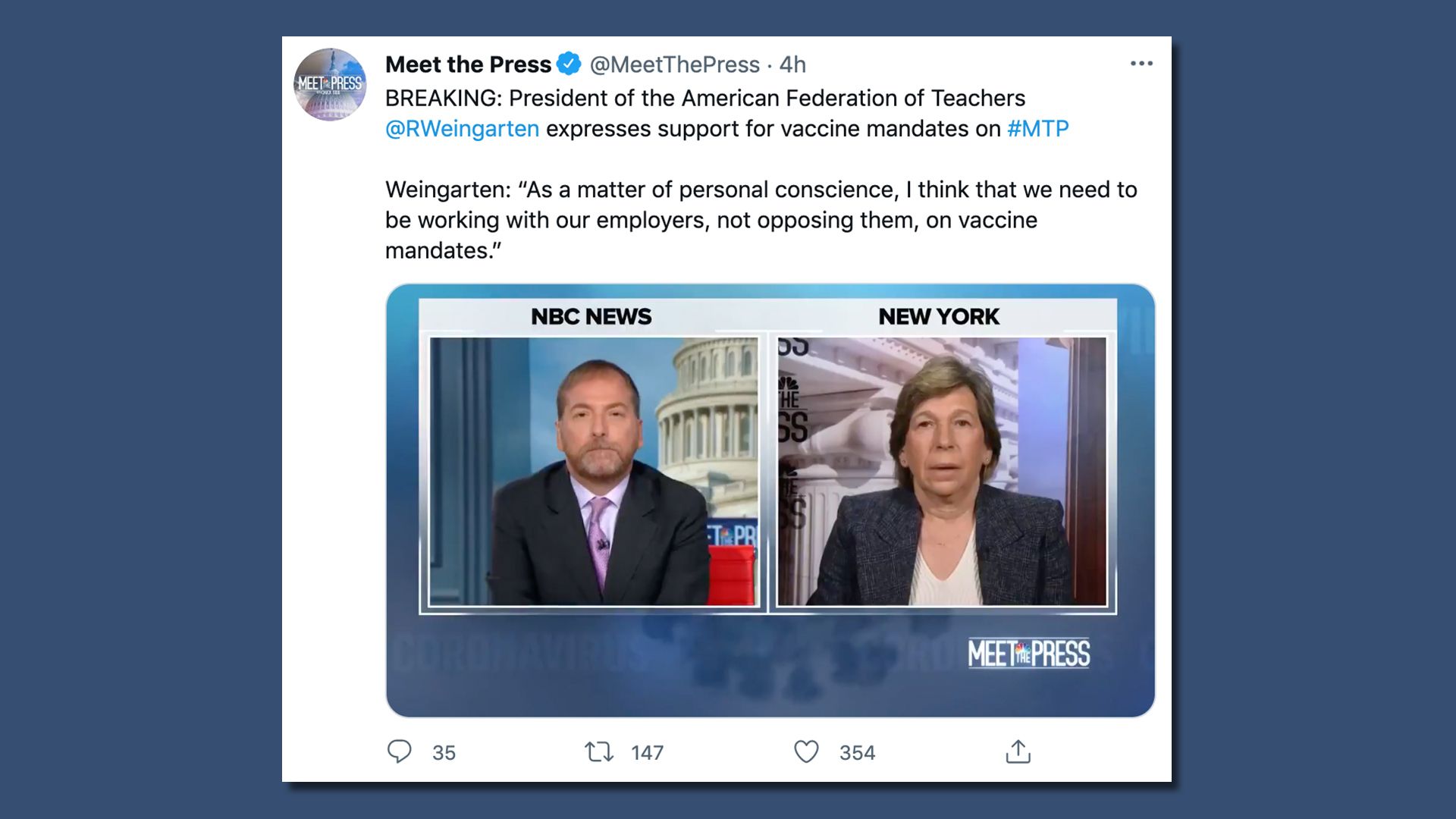| | | | | | | Presented By Facebook | | | | Axios Sneak Peek | | By Alayna Treene and Hans Nichols ·Aug 08, 2021 | | Welcome back to Sneak. That was a lot of "family and close friends." Smart Brevity™ count: 1,401 words ... 5.5 minutes. Edited by Glen Johnson. | | | | | | 1 big thing: GOP gusher |  | | | Illustration: Shoshana Gordon/Axios | | | | Inflation, rising crime and the border surge are positioning Republicans for even bigger midterm gains than they'd imagined just months ago, Axios' Stef Kight and Alayna Treene write. Why it matters: President Biden has preached bipartisanship. Strident Democrats are pushing for hard-left positions enacted through their control of Congress and the White House. But the daily headlines are boosting the GOP's arguments as it seeks to regain control of at least one chamber in 2022. - One early salvation for Democrats — their handling of the coronavirus pandemic — is turning into a liability as the Delta variant threatens school reopenings, a return to mask mandates and a new wave of shutdowns.
- "This administration has mismanaged the economy, mismanaged the border, mismanaged crime in the cities, and people are noticing and are very disturbed by it. Take a look at any of the poll numbers," Sen. John Barrasso (R-Wyo.), chairman of the Senate Republican Conference, told Axios.
- Barrasso said he circulated internal polling data on these issues during a conference meeting last Tuesday. Sen. Rick Scott (R-Fla.), chairman of the National Senatorial Campaign Committee, told Axios his group's internal polling shows similar results.
What to watch: These issues are dominating headlines as members of Congress are heading home to campaign in their districts during the August recess. - At the forefront is the Democrats' plan to use their majorities to pass a $3.5 trillion "soft" infrastructure bill on top of a $1.2 trillion bipartisan "hard" infrastructure bill.
- The monster spending is really resonating with voters — in a bad way, spokesmen for the GOP's House and Senate campaign arms tell Axios.
- Both organizations say this should be the No. 1 issue Republicans talk about over August break.
The Washington Post's Paul Kane reported yesterday that Democrats are being sent home "with just three bullet points: middle-class tax cuts; an infrastructure plan to create jobs; and lower health-care costs." - "Republicans have spent the last six months peddling the same extremist rhetoric that led to the Jan. 6 insurrection and spreading COVID disinformation," said Chris Taylor, spokesperson for the Democratic Congressional Campaign Committee.
- "Our bet is that voters know they can count on Democrats to deliver for their families."
At-risk Democrats are already starting to worry their messaging isn't sticking, though. - Rep. Sean Patrick Maloney (D-N.Y.), who chairs the DCCC, was quoted by CNN last week as saying, "If the election were held today, we would lose."
Keep reading. |     | | | | | | 2. New power brokers |  | | | Sen. Susan Collins (R-Maine) appears with other Repubiican infrastructure negotiators. Photo: Drew Angerer/Getty Images | | | | The G10 is on the cusp of a victory lap for getting a seemingly impossible infrastructure deal through the Senate — but the process also shows how a closely divided Congress has undercut the traditional power brokers. Why it matters: Committee chairs and their staffers told Alayna they're furious — "pissed" is the term one used — with how the bipartisan group bypassed traditional processes to produce a bill directly with the White House. And they worry it's part of a shifting power dynamic on Capitol Hill. - Just as groups of basketball players have been banding together to force owners to let them play on the same NBA team, groups of lawmakers can come together and set the terms for what they'll support.
- The traditional process of reaching consensus in a congressional committee is being upstaged by members who dictate what they will and won't support from the outset.
- As much power as holdouts Sens. Kyrsten Sinema (D-Ariz.) 0r Joe Manchin (D-W.Va.) can have in a 50-50 Senate, like-minded blocs in both the House and Senate can exert even more clout because their members can't be cast as outliers or picked off as easily. There's power in their numbers, and that makes them pivotal dealmakers.
- In the narrowly divided House, progressives like Reps. Alexandria Ocasio-Cortez (D-N.Y.) and Cori Bush (D-Mo.) need only a couple of allies to extract their own infrastructure bargain from House Speaker Nancy Pelosi (D-Calif.) and the White House.
What they're saying: The Senate is expected to pass the infrastructure package in the early hours of Tuesday morning, unless members strike an agreement to speed up the process. So far, attempts to do so have failed. Leadership in both parties predicts the bill will pass by a healthy margin. - "This is especially surprising, considering the fact that both [Sens. Mitch] McConnell and [Chuck] Schumer, as leaders of the United States Senate at various times, have always said they're going to work through the committee system," Sen. Chuck Grassley (R-Iowa), ranking member of the Senate Judiciary Committee, told Axios.
- "The Commerce Committee was at a disadvantage," Sen. Roger Wicker (R-Miss.), the panel's ranking member, told Axios. "It's a bit of a problem that you had people negotiating the [broadband] section that didn't have an expertise in that area."
- "The chairs were pissed; they still are," a Senate Republican aide to a relevant committee chair told Axios.
The other side: "I know the committees didn't really like it, but these guys got a work product, I mean, I'll be blunt," said Sen. Tim Kaine (D-Va.). "I'm not at all upset about the process. It did take some time, but that's because the bill is so big." Keep reading. |     | | | | | | 3. By the numbers: Word cloud |  Data: Quorum; Chart: Will Chase/Axios The 2,702-page bipartisan infrastructure package is a lengthy outline for new roads, bridges and other construction projects, yet it comes in only at 102nd for highest word count since the 101st Congress, according to data collected by Quorum and reviewed by Stef. By the numbers: It's been a wordy year for congressional bill writers. The top two bills for the highest word count were both introduced this year. - Two of the top bills are national defense authorization acts — bills passed every year to determine how the military can spend federal funds.
- The oldest bill to make the list for most words was the Senate's version of the "Welfare to Work" bill.
- The House's version was signed into law in 1996 by then-President Bill Clinton.
|     | | | | | | A message from Facebook | | Internet regulations are as outdated as dial-up | | |  | | | | Facebook supports updated regulations, including four areas where lawmakers can make quick progress: - Reforming Section 230.
- Preventing foreign interference in our elections.
- Passing federal privacy law.
- Setting rules that allow people to safely transfer data between services.
| | | | | | 4. Feast or famine for Trump backers |  | | | Sen. Josh Hawley challenges the 2020 election results just before the Jan. 6 Capitol siege. Photo: congress.gov via Getty Images | | | | High-profile Trump backers in Congress who tried to block Biden's election win have raked in cash this year. Many of their lesser-known rank-and-file colleagues have not, Axios' Lachlan Markay reports. Why it matters: New campaign finance data underscore a disparity among election objectors. Some have used the infamy to catapult themselves into MAGA stardom. Those who haven't — including some facing competitive 2022 re-election fights — are stuck with all the baggage and little financial benefit. By the numbers: Axios analyzed data from midyear filings with the Federal Election Commission, and there have been some clear winners in the money race. - Fundraising for Sen. Josh Hawley (R-Mo.) shot up by 3,552% compared to the first six months of the 2019 cycle. Sen. Ted Cruz's (R-Texas) was up by 832%.
- Rep. Matt Gaetz (R-Fla.) pulled in 752% more in the first half of the year, even as corporate PAC donations dried up almost entirely.
- Rep. Mo Brooks (R-Ala.), who reportedly helped organize the "Stop the Steal" rally that preceded the Jan. 6 Capitol siege, raised more than four times as much during the first six months of 2021 — when he announced his 2022 Senate bid — than he did in 2019.
On the other side of the equation are lesser-known lawmakers who haven't been able to capitalize on grassroots popularity to juice their 2021 fundraising. - Fundraising for Rep. Doug LaMalfa (R-Calif.) was down by more than 93%. Mississippi Rep. Michael Guest saw an 89% decline. The haul for Rep. Scott DesJarlais (R-Tenn.) dropped by 80%.
- A pair of Republicans on House Democrats' 2022 target list saw some significant fundraising declines: Rep. Steve Chabot (R-Ohio) pulled in 45% less than he did in 2019. The total for Rep. Dave Schweikert (R-Ariz.) was down 26%.
- Other members whose districts were considered competitive last year also raised significantly less. The haul for Rep. John Carter (R-Texas) fell by 49%. North Carolina Rep. Dan Bishop's declined 42%. Fellow North Carolinian Rep. Richard Hudson pulled in 18% less.
What they're saying: Doug Heye, a Harvard Institute of Politics fellow and a former senior House GOP leadership aide, called it the "immediate celebrification" of politics during an interview with Axios. Be smart: Heye pointed to an infamous photo of Hawley raising his fist in solidarity with Jan. 6 demonstrators before they breached the Capitol. - "It's not an exaggeration to say that one picture is worth a million dollars," he said.
Keep reading. |     | | | | | | 5. Tweet du jour |  | | | Via Twitter | | | | A homework assignment for teachers from union leader Randi Weingarten. |     | | | | | | A message from Facebook | | Why Facebook supports reforming Section 230 | | |  | | | | The internet has changed a lot in the last 25 years — the last time comprehensive internet regulations were passed. Facebook supports updated regulations — like reforming Section 230, to set standards for the way larger tech companies enforce rules about content. | | | | 📬 Thanks for reading. We'll be back next Sunday, and with another special Sneak Peek Thought Bubble in the interim to recap the latest congressional action. A reminder your family, friends and colleagues can subscribe to this or any of Axios' other free newsletters by clicking here. |  | | It'll help you deliver employee communications more effectively. | | | | | | Axios thanks our partners for supporting our newsletters. If you're interested in advertising, learn more here.
Sponsorship has no influence on editorial content. Axios, 3100 Clarendon Blvd, Suite 1300, Arlington VA 22201 | | | You received this email because you signed up for newsletters from Axios.
Change your preferences or unsubscribe here. | | | Was this email forwarded to you?
Sign up now to get Axios in your inbox. | | | | Follow Axios on social media:    | | | | | |
No comments:
Post a Comment